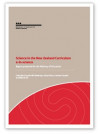This series e-Learning in science reports is part of a wider project 'Science in the New Zealand Curriculum'. This series is written for the Ministry Education by The New Zealand Council for Educational Research (NZCER) in collaboration with Learning Media and The University of Waikato. This strand explores three different aspects of e-learning in the sciences.
e-in-science: Developing innovation | This report explores innovative possibilities for e-in-science practice to enhance teacher capability and increase student engagement and achievement. It provides insights into how e-learning might be harnessed to help create a future-oriented science education programme and puts forward a possible framework. The report draws on four focus groups and two case studies.
e-in-science: Future-oriented science learning | This report brings together findings from earlier phases of the research, as well as parallel research on school engagement with the science community. The third phase of the project focused on developing a conceptual tool for exploring the potential of digital technologies to support future-oriented science learning and supporting teachers and school leaders to reflect on and enhance their practice. Two focus groups were involved, comprising experts from the school, tertiary and research and development sectors.
e-in-science: Scoping the possibilities | This report explores the possibilities that exist for e-in-science to enhance student engagement and learning in science. It uses as a framework three interconnecting purposes for using ICT in science education; that is, to support students to: work as scientists, work with scientists and work with one another to co-construct scientific knowledge and understanding.


